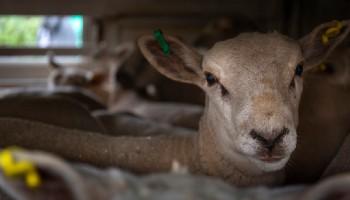Live transport of farm animals
Almost all farm animals are transported at some point in their lives – whether short or long distances. Most will eventually be moved to an abattoir for slaughter. We’re working in multiple ways to improve the conditions in which farm animals are transported across the UK.

Live exports banned
After more than 100 years of us and many others campaigning, the UK Government has banned the live export of animals from Great Britain for fattening and slaughter. This monumental decision means that British farmed animals will no longer face horrendous journeys abroad, some lasting over 100 hours, which caused severe physical and mental suffering. The ban came into effect on 20 May 2024.
This moment is a powerful reminder of what we can achieve when we campaign together for animal welfare.
Welfare issues with live transport
While the live export ban is a major achievement, many animals in the UK still face poor conditions when transported within the country. If animal welfare isn’t made a priority during transport, there is a high risk of suffering.
- Handling during loading and unloading can be stressful and cause injury
- Many livestock vehicles are ‘basic’, lacking proper ventilation or temperature control
- Animals face unfamiliar environments, noises, movements, and social disruption
- Long journeys without rest, food, or water can lead to exhaustion, overheating, dehydration and injury
These risks increase significantly as journey time lengthens. That’s why we believe:
- Live transport should be kept to an absolute minimum
- Animals should be slaughtered as close to the farm as possible
- Long-distance transport should be replaced with a meat- or carcass-only trade
- Transport must follow higher welfare standards, handled by trained and caring staff
Current legislation
Journey times
Short journeys - in ‘basic’ vehicles, journey times are limited to a maximum of eight hours.
Long journeys - in higher-spec vehicles with additional welfare features, journey times may be extended:
- Pigs: up to 24 hours (if water is continuously available)
- Cattle: up to 14 hours, then a one-hour break, followed by another 14 hours
- These journeys may occur in temperatures as high as 35°C
Fitness to travel and special requirements
Rules are in place to ensure animals are ‘fit’ to travel. Considerations include:
- Age
- Injuries or health conditions
- Pregnancy stage
Very young animals require extra bedding, and strict guidelines exist for ramp angles and loading practices.
Enforcement
Effective enforcement is vital to minimise suffering during transport:
- Transporters must carry documentation of journey details
- A valid authorisation (short or long journey) and certificate of competence are required
- Vehicles used for long journeys must be approved by authorities
- Checks are expected during and after transport
- Penalties, such as withdrawal of authorisation, can be issued for rule breaches
Improving animal transport
While live exports for slaughter and fattening are now banned, many animals in the UK are still transported long distances during their lives - and we continue to campaign to improve these journeys.
We improve the lives of millions of farm animals each year through our welfare standards, widely adopted across the UK farming industry. Developed using scientific research and practical experience, these standards apply to 10 of the most commonly farmed animals.
Our detailed transport requirements cover:
- Maximum journey lengths
- Minimum space allowances
- Training and competence of transporters
- Humane handling during loading and unloading
- Proper ventilation and temperature control
Engaging with decision makers
We regularly submit expert recommendations to UK and international authorities to influence stronger animal welfare laws. We gave both oral and written evidence to the inquiry into live transport and live exports, and continue to work with policymakers to implement and enforce the new export ban effectively, while pressing for improvements to domestic transport practices.
Stay involved
The live export ban is a momentous step forward, but there is still more to do. Help us keep the momentum going to improve how farm animals are transported and treated across the UK. Sign up for our campaign updates and be part of the movement to give every animal a life worth living.


